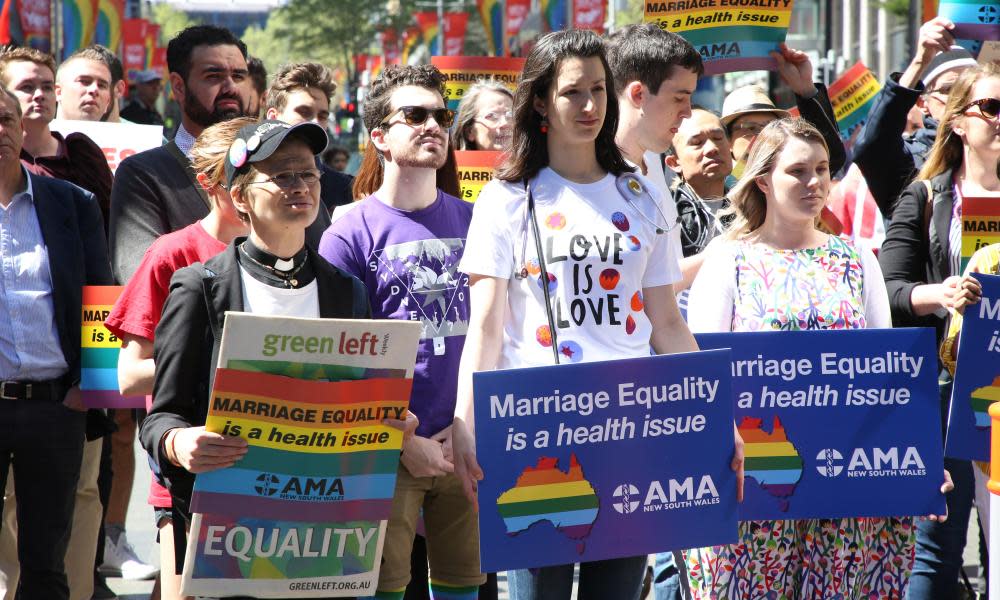Marriage equality support falls but yes vote still leads – Guardian Essential poll

Public support for marriage equality has dropped 4% in a fortnight and opposition is up 3%, according to the latest Guardian Essential poll.
With the postal survey campaign now in full swing, and with analysis suggesting opponents of marriage equality have outspent the yes campaign by about five-to-one in television ads, the latest poll shows 55% (down 4% from a fortnight ago) support changing the law to allow same-sex couples to marry and 34% (up 3%) are opposed.
But while support for a yes vote has fallen as the no campaign has intensified its efforts to raise concerns about religious freedom, including with public interventions by the former prime minister John Howard, there is a structural upside for the yes campaign – given the postal survey will turn ultimately on efforts to get out the vote in a non-compulsory ballot.
People indicating they will definitely vote in the survey are more likely to support same-sex marriage than oppose it and, of the group who have already cast their votes, 59% support same-sex marriage and 37% oppose changing the law.
The latest poll of 1,808 respondents indicates 71% of people in favour of same-sex marriage will definitely vote compared with 60% of those opposed.
Nine per cent of the Guardian Essential poll sample have already cast their vote and 62% (no change from a fortnight ago) say they will “definitely” vote and 12% (down 4%) will “probably” vote.
The poll finds 11% yet to take a position on whether to vote yes or vote no.
A clear majority of Labor and Greens supporters are yes voters, while the Coalition cohort is more evenly split, with 47% voting yes, 42% voting no and 12% undecided. Those most in favour of changing the marriage laws are Labor voters (65%), Greens voters (83%), women (62%) and people aged between 18 and 34 (61%).
The latest poll shows federal Labor maintaining an election-winning lead over Malcolm Turnbull’s government on the two-party preferred measure – but the gap has narrowed over the past week in the government’s favour.
Last week, Labor was ahead of the Coalition on 54% to 46%. This week, Labor is ahead 52% to 48%. The margin of error for the Guardian Essential poll is plus or minus 3%.
Survey respondents were also asked a number of questions about climate change and cost of living – with both of those issues featuring in the political debate over energy policy, which dominated the last parliamentary sitting fortnight.
There has been an increase since February in the number of Australians agreeing with the statement that climate change is happening and is caused by human activity.
A clear majority agrees with that statement, 60% of the sample, up 4% from when the question was last asked in February – while 24% (down 1%) believe we may just be witnessing a normal fluctuation in the Earth’s climate.
People under 35 are more likely to have the view that climate change is happening than people over 55 but a majority of the over 55s (54%) also say climate change is happening and is caused by human activity.
Voters are also increasingly concerned that not enough is being done to mitigate the risks, with 56% (up 7% since December) believing Australia is not doing enough to address climate change and 20% (down 2%) thinking Australia is doing enough.
Young people and people with university-level education are the most concerned about government inaction on climate change. Of the cohort who believe that climate change is happening, 75% think Australia is not doing enough.
In making its decision about energy policy over the coming weeks, in political terms, the Turnbull government will have to balance community concerns about climate risks with cost of living pressures and it is clear that rising energy prices are also biting.
When it comes to cost of living pressures, people are most concerned about rising electricity and gas bills (46%), followed by housing (34%), medical and dental (25%) and fresh food (21%).
Voters aged between 18 and 34 were most concerned about the cost of housing (47%), followed by electricity and gas (42%) and fresh food (25%).
People aged between 35 and 54 were more worried about utility bills (52%) than housing (39%) – followed by medical and dental costs (28%).
Voters over 55 were also most concerned about costs of electricity and gas (52%) and medical/dental (28%).
With slow wages growth also a hot button political issue, as well as a challenge for the Australian economy, 52% of the Guardian Essential sample said they had not had a salary boost in the past 12 months.
Thirty-six per cent of workers reported a wage increase in the past year, with 43% of full-time workers and 34% of part-time workers saying they had received a pay increase in the last 12 months.
Workers earning higher salaries were also more likely to have had a boost to their pay packet in the past 12 months, with 46% of workers earning $2,000 or more per week saying they had a wage increase compared to 25% of those earning less than $1,000 per week.
When asked to reflect on their personal financial situation, 33% of the sample said they were financially comfortable, 43% were “managing” and 20% said they were under financial pressure.

 Yahoo News
Yahoo News 
